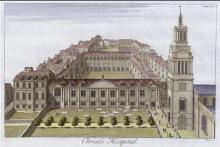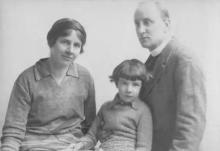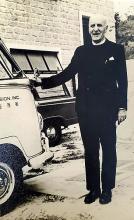Vyvyan Henry Donnithorne (Archdeacon) was a Church-of-England missionary, who served in China with his wife for his working life, before retiring to Hong Kong.
Born in London in 1886, he had an older brother and three sisters. The census of 1891 is very revealing. Vyvyan is aged 4, the family is living at Colne Lodge, Staines Rd, Twickenham, a very large detached property housing 13 people. Father Edward is a colonel in the Army Reserve (Scots Greys), a Justice of the Peace and a Manufacturer of Engines, and clearly comfortably off with five children and six servants - viz a ladysmaid, housemaid, nurse, nursemaid, cook and kitchen-maid! That wasn't to last though.
The 1901 census wouldn’t come up for Vyvyan Donnithorne but after some searching it was found under ‘Vyorgan Henry Donnishorne’! This is interesting because it finds him as a scholar, age 15, boarding at Christ’s Hospital, a school founded in the 16th century in Christchurch, London. It had about 500 pupils (who all had to be entered on the census, full names, along with age and place of birth!). A benefactor had paid for Vyvyan to have a scholarship here as Vyvyan’s father had gone bankrupt.
Young Donnithorne finished his school life in Horsham as the ‘Hospital’ moved to Horsham the following year (1902), to a far larger site surrounded by green space with room to expand. He had to leave at age 16 though, when his scholarship ended, but he was a bright young man, and built on the solid foundation he had been given.
Leaving school in 1902, he studied at the University of London College of Engineering, 1902-1905, became an engineer and at some point switched from mechanical engineering to electrical engineering. He then sought a job to assist with the family finances and found a position in London as technical manager for a company manufacturing X-ray apparatus for hospitals all over the UK. His career path looked set.
However in 1909, when he was aged 23, he found himself in Keswick during the annual Convention and through conversations with evangelical Christians there and reading the Gospels for himself, came to a real faith of his own. Within a fortnight of his conversion, he discovered and joined the Cambridge University Mission to Bermondsey, establishing Christian boys' clubs in the darkest slums of London's east end. He worked there in his spare time over the next three years, during which time his heart began drawing him to the mission field, and China in particular.
The 1911 census finds a very much reduced Donnithorne family at 2 Belvedere Grove, Wimbledon, a very large semi-detached property, but sans father Edward, who died in 1906. It’s just mother Harriette Donnithorne as head, with Vyvyan, an Electrical Engineer and Employer, his sister Edith, and one domestic.
With China in his sights, Vyvyan used a family bequest to fund a degree (the Chinese Tripos) at Clare College, Cambridge, being the first person to take this course, and he graduated in 1914 with a First Class degree.
He joined the Church Missionary Society, but then because of the War, he enlisted in the army. When they found out he was a Cambridge graduate, they took him out of the ordinary ranks and sent him to officer training school. However, he sustained a severe leg wound at Loos, France in January 1916. He received the Military Cross for his courage, but it ended his military career.
While he was recuperating back home in Twickenham, London, he was visited by Gladys Ingram, whose family lived close by. The two became close, Vyvyan proposed, Gladys accepted, and they became engaged. The couple were then separated for the next 3 years as Gladys went out to Egypt to work with Oswald Chambers in the YMCA at Zeitoun. Vyvyan returned to Cambridge for post-graduate study in 1919, studying theology for a year at Ridley Hall.
Gladys returned from Egypt that year and they married in September. Also in that year Vyvyan was ordained and in November they went out with the CMS on the Empress of France to Szechuan Province in China, aged 33 and 28. After two years of language study, Vyvyan was appointed to pioneer evangelistic work not only in the frontier city of Anhsien, but also seven other outstations, each with a church and Chinese pastor. In addition, a visit had to be paid once a year to the furthest outstation of Mowchow on the China Tibet border. The work involved a lot of walking on his mended leg, there being no transport, but the happy outcome was a fully restored left leg.
In 1922 their one daughter Audrey was born in Santai, Szechuan.
In 1925 following the Shanghai incident there were anti-British uprisings in China and they were captured by Red Lantern bandits with 6 other missionaries for 3 weeks before being ransomed and rescued.
In 1927 they were back in England on furlough.
In July 1935 they were again on a year's furlough in England. That year Vyvyan was appointed to be Archdeacon of the Anglican Diocese of West Szechuan. Daughter Audrey says that also on offer at the time was a parish in Falmouth, which she feels her father might well have preferred in his home county of Cornwall, but her mother, missionary through and through, had strongly opposed it. In Szechuan along with a group of keen workers they conducted tent meetings, which lasted all day, 'and many were brought into the church by this means.' Mrs Donnithorne did 'splendid work' among the women of the Diocese and in helping her husband in the conducting of Bible Schools. Although they were engaged primarily in rural evangelism, 'they gave themselves wholeheartedly to parochial work . . . and the welfare of the Christian congregations.'*
During WWII the Donnithornes returned to England (1943-45) but then went back to Szechuan Province to base themselves in Beipei for the next few years.
In 1946 they left the CMS and formed their own group of like-minded missionary friends called The West China Evangelistic Band. The CMS accepted his resignation 'with regret' but were 'very grateful and deeply indebted' for his and Mrs Donnithorne's 22 years of service.
In 1949 when the Communists took over Szechuan Province, Vyvyan had just returned to England on his own, and had to wait two years for Gladys to be released from custody, deported to Hong Kong, and return to England in 1951.
She then joined him in his final posting as pastor of a church in the Canary Isles until 1952 when he and Gladys retired to Hong Kong. They lived in a flat in Kowloon Tong, and their church was St Andrews, Kowloon.
In Hong Kong, ‘advancing years did not deter them’ from lives of service and good works. They gave assistance to refugees from China and gave support and assistance to the Shatin Babies' Home, (they were known as Uncle and Auntie Donny), serving the Home as Advisory Friends.
When Audrey visited Hong Kong in 1967 she felt her father was feeling the weight of his years, whereas her mother remained busily active. In December 1968 Vyvyan suffered a bad stroke, not his first, and he was admitted to the Matilda Hospital on the Peak, which offered free treatment for missionaries. He died that same month, aged 82.
Archdeacon Donnithorne was buried in the Hong Kong Cemetery. Gladys remained busy until her death in 1977, and she was buried with him.
*Quotes from the CMS letter to the Donnithornes on their resignation in 1946.
----------------------------------------------------
Sources: Wikipedia; MichelleUle.com
China in Life's Foreground - Audrey Donnithorne
The Yip Family of Amah Rock - Jill Doggett
Ancestry.co.uk



Comments
The Donnithornes and The Shatin Babies' Home
The Donnithornes were keen supporters of Mildred Dibden and The Shatin Babies' Home. Their arrival in HK coincided with the move into the Old Police Station in May 1953 and they got busy straightaway - 'Mrs Donnithorne, of the West China Evangelistic Band, organised the arrangement of the furniture in all the rooms ...Her husband, the Venerable Archdeacon V H Donnithorne, frequently plodded with her along the dusty tracks leading up to the home on the hill. Advancing years did not deter them....When the great day came...Mrs Donnithorne, with willing volunteers (from the Toc H) had all the furniture in place so that all the babies (16 at this time) could be put straight into their cots. Then there was tea for all the adults.'
A lot of this furniture was provided by two Chinese benefactors, Mr Ching King-sun and Mr Pang Iu-man, who were keen to help the good work.
Source: The Yip Family of Amah Rock by Jill Doggett
Shatin Old People's Home
The Donnithornes get a mention in one of Mildred Dibden's newsletters to supporters in October 1959:
'Another special joy has been the opening of the Old People's Home here in Shatin! God put a wonderful thought into the hearts of Archdeacon and Mrs. Donnithorne which has now developed into fact. These old folk, taken from the most miserable of conditions, homeless and uncared for, now have a home, a pretty garden and proper care. And they feel, too, that it IS their home, and that they have a responsibility to welcome visitors and show them round. Isn't it a lovely thought to become fact? On the day they moved in, Esther Leung and I went along to help where we could. It was the happiest occasion - the old folk so smiling and thankful. It just filled our hearts with praise to God. We pray that He will bless and prosper the work, and glorify His Name there.'
Ancestry records
1886 Jan 8th - Birth Vyvyan Henry Donnithorne. (UK Mechanical Engineer Records).
1891 census – Donnithornes, Colne Lodge, Staines Rd, Twickenham. Father Edward George Moore Donnithorne was a Colonel in the Army Reserve, Manufacturer of engines, and Justice of the Peace. Mother Harrietta Lucia, Children 3 daughters, 2 sons, Vyvyan 5, with 6 servants! - Ladysmaid, housemaid, nurse, nursemaid, kitchenmaid, cook.
1896-1902 Education Christ (sic) Hospital, Horsham. (UK Mechanical Engineer Records).
1901 census - Vyorgan Henry Donnishorne (sic), scholar, 15, Christ’s Hospital school, c500 pupils, Christchurch, Newgate Street, London. In 1902 the school was moved to Horsham, a far larger site surrounded by green space.
The rest of the family (Donnithon) were at Briar House, 178 Colne Road, Twickenham, a magnificent 3-storey 18th century town house. The Donnithorne parents were there with 1 son and 3 daughters, plus a cook/domestic.
1902-1905 City and Guilds, London Technical College, Finsbury. UK Mechanical Engineer Records.
1905 Oct - Served an Engineering Apprenticeship with Messrs William Doxford and Sons, Shipbuilders and Engineers, Sunderland. UK Mechanical Engineer Records.
1906 3rd Feb - Membership date Institute of Mechanical Engineers, Vyvyan H Donnithorne 20.
1911 census - 2 Belvedere Grove, Wimbledon. V large semi. Father dead. Mother Harriette 61, Vyvyan 25 electrical engineer, employer, sister Edith and one domestic.
1919 Dec 9th – dep Liverpool for Canada, the Empress of France, Mr H Donnithorne 33, Missionary, Mrs Donnithorne 28, Housewife,
1927 Apr 21st, arr London from Shanghai, the Mongolia, Mr V H Donnisthorne (sic) 41, clergyman, Mrs G Donnisthorne 35, home duties, Master A Donnisthorne 4, scholar, dest Creatway House, Dover House Road, SW15. Country of Res China.
1929-30 UK Electoral Register – Vyvyan H Donnithorne, Gladys Emma Donnithorne, residing at Anshien, Stoke Road, Stoke Poges.
1935 Jul 1st, arr London from China via Canada, the Alaunia, Vyvyan Donnithorne 49, clergyman, Gladys Donnithorne 44, missionary, destination The Priory, Wimbledon Common, London.
1936 Oct 3rd, dep Southampton for China via Canada, the Empress of Britain, Vyvyan Donnithorne 50, clergyman, Gladys Donnithorne 45, housewife, from c/o Church Missionary Society, Salisbury Square EC4, intended perm res China.
1943 Nov 25th arr Glasgow from Bombay, the Nea Hellas, The Ven Archdeacon Donnithorne 56, Mrs Gladys Donnithorne 51, destination Hilltop Cottage, Warboys Road, Kingston Hill, Surrey. (Back in Britain 1943-45)
1945 Nov 13th, dep London for China, the Drottningholm, Vyvyan H Donnithorne 59, missionary, Gladys E Donnithorne 54, housewife, from 48a High Street, Wimbledon.
1949 Aug 22nd, dep Hong Kong for London, the City of Sydney, Vyoyan(sic) H Donnithorne 64, Archdeacon Church of England, dest c/o Mrs Lawrence, Hillton Cottage, Warboys Rd, Kingston Hill, Surrey, last perm res China, fut res England.
1952 Dec12th, dep Soton for Hong Kong, China, the Carthage, Vyvyan H Donnithorne 66, clergyman, Gladys E Donnithorne 61, housewife, from 65 Blenheim Terrace, NW8.
1953 Electoral Register Vyvyan H Donnithorne, Gladys E Donnithorne, 3 Boundary Road, St Marylebone, London.
1953 Electoral Register Vyvyan H Donnithorne, Gladys E Donnithorne, 3 Blenheim Terrace, St Marylebone, London.
There are more passenger lists, but those are records in Canada and America to which I don’t have access.